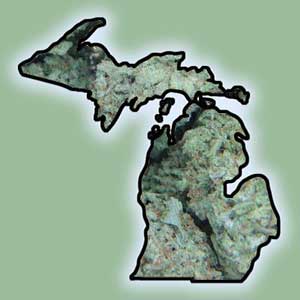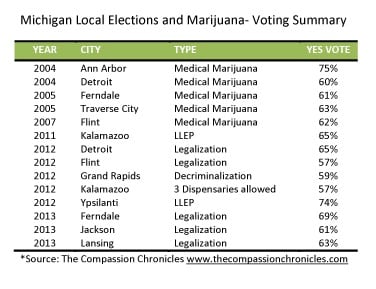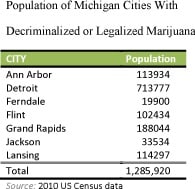 FLINT– 14 times in the last nine years, Michigan voters have been given the option to relax or remove marijuana penalties in a local election. 14 times they have said ‘Yes’, and after November’s trio of victories 1.3 million Michigan citizens will now live in cities with either decriminalized or legalized adult use of marijuana.
FLINT– 14 times in the last nine years, Michigan voters have been given the option to relax or remove marijuana penalties in a local election. 14 times they have said ‘Yes’, and after November’s trio of victories 1.3 million Michigan citizens will now live in cities with either decriminalized or legalized adult use of marijuana.
Legalized adult use laws remove all criminal penalties for the use or possession of small amounts of marijuana; most cities define adult as 21 years of age but in Flint the age is 19. Some cities have legalized transfer of marijuana between adults. A decriminalization law changes those use or possession of small quantity penalties from criminal status to a civil infraction issue, handled with a citation or a ticket instead of a misdemeanor charge. Neither program allows impaired driving or access to marijuana by minors.
Michigan spends about $325 million annually to enforce marijuana laws. In the state’s longest-running model of decriminalization, the city of Ann Arbor, the civil infraction method has proven to be a very effective tool and has not resulted in an increase in crime related to marijuana. Ann Arbor Rep. Jeff Irwin, a Democrat, has initiated legislation that would on a statewide level.
Not included among the 14 elections is the state-wide Voter Directed Initiative 1 of 2008, now called the Michigan Medical Marihuana Act (MMA). The measure carried 63% of the vote; the MMA’s margin of victory would be considered a landslide win in any other election but in the voting history of Michigan and marijuana, it’s just about average.
 What those 14 votes do reflect are multiple methods of making communities more marijuana-friendly. Lowest Law Enforcement Priority (LLEP) measures instruct police to consider enforcement of marijuana crimes as their least important duty, a choice taken by two communities. Some cities passed laws removing all criminal penalties for use of medical marijuana, which essentially legalized use of cannabis by all adult residents until the 2008 vote defined exactly who those medical marijuana patients are.
What those 14 votes do reflect are multiple methods of making communities more marijuana-friendly. Lowest Law Enforcement Priority (LLEP) measures instruct police to consider enforcement of marijuana crimes as their least important duty, a choice taken by two communities. Some cities passed laws removing all criminal penalties for use of medical marijuana, which essentially legalized use of cannabis by all adult residents until the 2008 vote defined exactly who those medical marijuana patients are.
Although many Michigan communities have authorized or are allowing medical marijuana distribution centers to operate within city limits, those rules are often passed through the hands of City Councils; only once have a city’s voters been given the option to elect or refuse dispensaries. That victory came in 2012, when Kalamazoo voters gave the measure a thumbs-up by a 57% margin.
The Kalamazoo win came despite questions surrounding the legal status of organized distribution of medicinal cannabis in Michigan. Although not expressly created by the 2008 MMA, distribution centers were a centerpiece of the publicity surrounding the medical marijuana proposal in the months before the election took place. Even when the legality of the proposal has been questioned by city officials- as in Kalamazoo- or when the state’s Governor and Attorney General speak out against a ballot proposal- as in Lansing- the people consistently elect to roll back restrictions on marijuana use.
 The 14 wins have been hard-fought. Detroit’s marijuana legalization vote in 2012 was made possible by petition drives that took place in 2010. The delay was created by the Detroit Election Commission, who challenged the proposal’s language all the way to the Michigan Supreme Court. After winning their victory as part of 2012-s 5-city election sweep, proponents of the Grand Rapids decriminalization measure faced court battles challenging the newly-approved ordinance.
The 14 wins have been hard-fought. Detroit’s marijuana legalization vote in 2012 was made possible by petition drives that took place in 2010. The delay was created by the Detroit Election Commission, who challenged the proposal’s language all the way to the Michigan Supreme Court. After winning their victory as part of 2012-s 5-city election sweep, proponents of the Grand Rapids decriminalization measure faced court battles challenging the newly-approved ordinance.
In both cases the people prevailed; Detroit offered the option to their voters in 2012 and the Grand Rapids ordinance stands as law.
The ability of cities to adopt ordinances that vary from the state law is still being hotly debated as the case of Ter Beek v Wyoming is pending in the Michigan Supreme Court. That case stems from the city of Wyoming, Michigan’s passage of an ordinance that prohibits all acts that violate federal law; all marijuana use, possession and cultivation remains federally illegal. John Ter Beek, a local attorney, sued the city to prevent them from circumventing the MMA. Oral arguments were heard in the state’s highest court earlier this year. A decision in the case could come at any time.
Source: The Compassion Chronicles
























